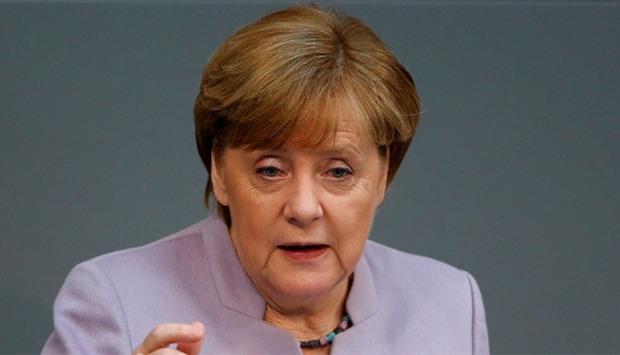Social Democrat chief Martin Schulz lashed out yesterday at Chancellor Angela Merkel, accusing her of “arrogance” as he sought to reverse his party’s plunging popularity three months before general elections.
Schulz’s decision to take his party’s reins initially jolted the Social Democratic Party (SPD) to life, but the trend has reversed.
With weeks to go before Germany heads to the polls on September 24, the SPD is trailing Merkel’s centre-right Christian Democratic Union (CDU) by 15 percentage points, according to a survey published Sunday by Bild am Sonntag.
Schulz was in a combative mood at yesterday’s special congress gathering party rank-and-file to approve their campaign programme, with harsh words for Merkel whom he accused of launching an “attack against democracy” by “systematically refusing debate on the future of the country”.
Merkel’s tactic, he said, is to hold off on airing her views rather than engage, thereby making people lose interest in politics.
While the Social Democratic Party (SPD) takes position on issues, “the other side is silent”, said Schulz.
“That’s what one calls in circles in Berlin asymmetric demobilisation. I call it an attack against democracy,” charged Schulz, whose party is a junior partner of Merkel’s grand right-left coalition.
“The biggest danger is the arrogance of power,” he warned.
But CDU general secretary Peter Tauber hit back quickly, saying on Twitter: “The desperation must be so deep that we democrats are being accused of attacks against democracy.”
The general secretary of Merkel’s Bavarian allies CSU, Andreas Scheuer, also told Passauer Neue Presse that the “personal attacks against the chancellor...show the huge helplessness of the SPD”.
Meanwhile in Dortmund, Schulz underlined his party’s push for “social justice”, with higher taxes for big earners and free schooling for all.
He also laid down gay marriage as a condition for any future coalition involving the SPD.
“I will sign no coalition deal in which marriage for all is not inscribed,” said the 61-year-old former European Parliament chief, who was rewarded with 10 minutes of applause for his 90-minute speech.
The SPD’s call for gay marriage comes just a week after the Greens set a similar condition, putting pressure on Merkel’s CDU, which has so far refused to allow same gender couples to wed.
The SPD will be hoping its campaign programme will help it regain ground, but Schulz himself has warned of a “rocky road” ahead after his party suffered heavy losses in three straight state elections viewed as dress rehearsals ahead of the September vote.
For analysts, the sudden drop in support for Schulz’s SPD boils down to the government’s success in curbing a refugee influx that saw 890,000 migrants arrive in 2015.
Schulz initially “was presented as an alternative to Madame Merkel”, said Gero Neugebauer, a political science analyst at Berlin’s Free University.
“He was relatively new and had criticisms against the chancellor’s immigration policy which had divided public opinion,” added Neugebauer.
But migrant arrivals have tapered off, and Merkel’s CDU and CSU “have won increasing trust that they have the best strategy to deal with the refugee situation”, Renate Koecher from opinion research group Allensbach Institute wrote in the Frankfurter Allgemeine Zeitung.
But former chancellor Gerhard Schroeder sought to boost morale, telling the congress yesterday that “there is still time to turn the tide” as many voters decide only at the last minute.
Warning the party against wavering, the veteran SPD heavyweight said that “there can be no self-doubt along the way”.
Party members are so far still keeping the faith, perhaps for want of an alternative. “The SPD should not be underestimated. Angela Merkel is trying to lull the voters to sleep and keep them away from the election... but she won’t succeed this time,” Leon Hahn, who heads the party’s youth wing in the southwestern state of Baden-Wuerttemberg, told AFP.

German Chancellor Angela Merkel
